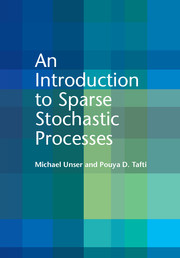Book contents
- Frontmatter
- Dedication
- Contents
- Preface
- Notation
- 1 Introduction
- 2 Roadmap to the book
- 3 Mathematical context and background
- 4 Continuous-domain innovation models
- 5 Operators and their inverses
- 6 Splines and wavelets
- 7 Sparse stochastic processes
- 8 Sparse representations
- 9 Infinite divisibility and transform-domain statistics
- 10 Recovery of sparse signals
- 11 Wavelet-domain methods
- 12 Conclusion
- Appendix A Singular integrals
- Appendix B Positive definiteness
- Appendix C Special functions
- References
- Index
10 - Recovery of sparse signals
Published online by Cambridge University Press: 05 September 2014
- Frontmatter
- Dedication
- Contents
- Preface
- Notation
- 1 Introduction
- 2 Roadmap to the book
- 3 Mathematical context and background
- 4 Continuous-domain innovation models
- 5 Operators and their inverses
- 6 Splines and wavelets
- 7 Sparse stochastic processes
- 8 Sparse representations
- 9 Infinite divisibility and transform-domain statistics
- 10 Recovery of sparse signals
- 11 Wavelet-domain methods
- 12 Conclusion
- Appendix A Singular integrals
- Appendix B Positive definiteness
- Appendix C Special functions
- References
- Index
Summary
In this chapter, we apply the theory of sparse stochastic processes to the reconstruction of signals from noisy measurements. The foundation of the approach is the specification of a corresponding (finite-dimensional) Bayesian framework for the resolution of ill-posed inverse problems. Given some noisy measurement vector y ∈ ℝM produced by an imaging or signal acquisition device (e.g., optical or X-ray tomography, magnetic resonance), the problem is to reconstruct the unknown object (or signal) s as a d-dimensional function of the space-domain variable r ∈ ℝd based on the accurate physical modeling of the imaging process (which is assumed to be linear).
The non-standard aspect here is that the reconstruction problem is stated in the continuous domain. A practical numerical scheme is obtained by projecting the solution onto some finite-dimensional reconstruction space. Interestingly, the derived MAP estimators result in optimization problems that are very similar to the variational formulations that are in use today in the field of biomaging, including Tikhonov regularization and l1-norm minimization. The proposed framework provides insights of a statistical nature and also suggests novel computational schemes and solutions.
The chapter is organized as follows. In Section 10.1, we present a general method for the discretization of a linear inverse problem in a shift-invariant basis. The corresponding finite-dimensional statistical characterization of the signal is obtained by suitable “projection” of the innovation model onto the reconstruction space. This information is then used in Section 10.2 to specify the maximum a posteriori (MAP) reconstruction of the signal.
Information
- Type
- Chapter
- Information
- An Introduction to Sparse Stochastic Processes , pp. 248 - 289Publisher: Cambridge University PressPrint publication year: 2014
